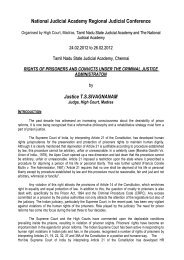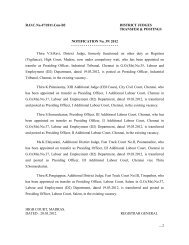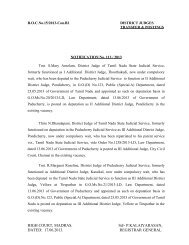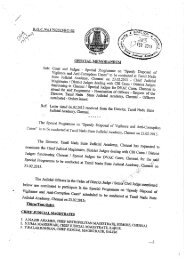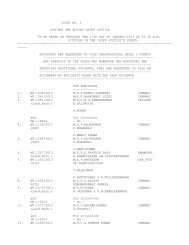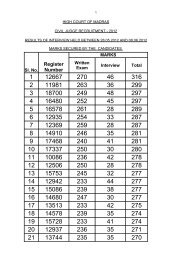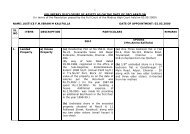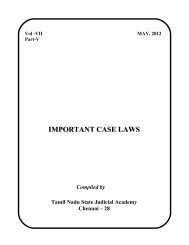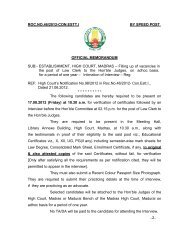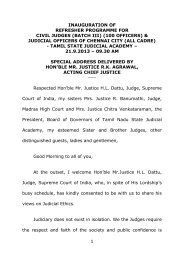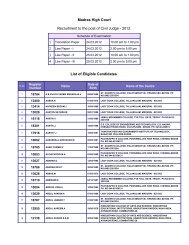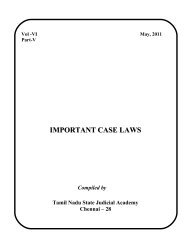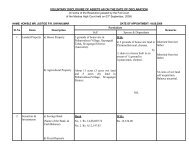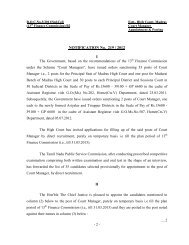Appreciation of Evidence in Sessions Cases - Justice D.Murugesan
Appreciation of Evidence in Sessions Cases - Justice D.Murugesan
Appreciation of Evidence in Sessions Cases - Justice D.Murugesan
You also want an ePaper? Increase the reach of your titles
YUMPU automatically turns print PDFs into web optimized ePapers that Google loves.
Scope and applicability <strong>of</strong> Extra-Judicial Confession :<br />
The Hon’ble Apex Court <strong>in</strong> Chattar S<strong>in</strong>gh and Anr. V. State <strong>of</strong> Haryana reported <strong>in</strong> 2008 (8)<br />
Supreme 178 has held that,<br />
“17. Confessions may be divided <strong>in</strong>to two classes i.e., judicial and extra-judicial. Judicial<br />
confessions are those which are made before a Magistrate or a court <strong>in</strong> the course <strong>of</strong> judicial<br />
proceed<strong>in</strong>gs. Extra-judicial confessions are those which are made by the party elsewhere than<br />
before a Magistrate or Court. Extra-judicial confessions are generally those that are made by a<br />
party to or before a private <strong>in</strong>dividual which <strong>in</strong>cludes even a judicial <strong>of</strong>ficer <strong>in</strong> his private capacity.<br />
.... As to extra-judicial confessions, two questions arise : (i) were they made voluntarily ? And (ii)<br />
are they true ? ...<br />
18. An extra-judicial confession, if voluntary and true and made <strong>in</strong> a fit state <strong>of</strong> m<strong>in</strong>d, can be relied<br />
upon by the court. The confession will have to be proved like any other fact. The value <strong>of</strong> the<br />
evidence as to confession, like any other evidence, depends upon the veracity <strong>of</strong> the witness to<br />
whom it has been made. The value <strong>of</strong> the evidence as to the confession depends on the reliability<br />
<strong>of</strong> the witness who gives the evidence. It is not open to any court to start with a presumption that<br />
extra-judicial confession is a weak type <strong>of</strong> evidence. It would depend on the nature <strong>of</strong> the<br />
circumstances, the time when the confession was made and the credibility <strong>of</strong> the witnesses who<br />
speak to such a confession. Such a confession can be relied upon and conviction can be founded<br />
thereon if the evidence about the confession comes from the mouth <strong>of</strong> witnesses who appear to be<br />
unbiased, not even remotely <strong>in</strong>imical to the accused, and <strong>in</strong> respect <strong>of</strong> whom noth<strong>in</strong>g is brought out<br />
which may tend to <strong>in</strong>dicate that he may have a motive <strong>of</strong> attribut<strong>in</strong>g an untruthful statement to the<br />
accused, the words spoken to by the witness are clear, unambiguous and unmistakably convey<br />
that the accused is the perpetrator <strong>of</strong> the crime and noth<strong>in</strong>g is omitted by the witness which may<br />
militate aga<strong>in</strong>st it. After subject<strong>in</strong>g the evidence <strong>of</strong> the witness to a rigorous test on the touch-stone<br />
<strong>of</strong> credibility, the extra-judicial confession can be accepted and can be the basis <strong>of</strong> a conviction if it<br />
passes the test <strong>of</strong> credibility.”<br />
1) AJAY SINGH Vs.. STATE OF MAHARASHTRA [AIR 2007 SUPREME COURT 2188]<br />
HEAD NOTE (A): <strong>Evidence</strong> Act (1 <strong>of</strong> 1872), S.24 – Extra Judicial confession – Exact words used by<br />
accused – Need not be stated – But there should not be vital and material difference.<br />
As regards extra judicial confession though it is not necessary that the witness should speak the<br />
exact words but there cannot be vital and material difference. It is not <strong>in</strong>variable that the Court should not<br />
accept such evidence if actual words as claimed to have been spoken by accused are not re-produced and<br />
the substance is given. It will depend on circumstance <strong>of</strong> the case. If substance itself is sufficient to prove<br />
culpability and there is no ambiguity about import <strong>of</strong> the statement made by accused, evidence can be<br />
acted upon even though substance and not actual words have been stated. Human m<strong>in</strong>d is not a tape<br />
recorder which records what has been spoken word by word. The witness should be able to say as nearly<br />
as possible actual words spoken by the accused. That would rule out possibility <strong>of</strong> erroneous <strong>in</strong>terpretation<br />
<strong>of</strong> any ambiguous statement.<br />
(Para 7)<br />
13



